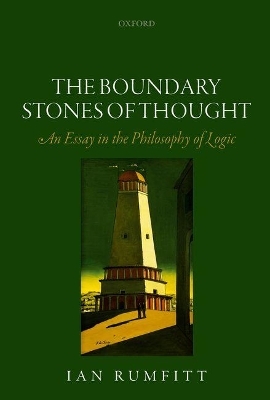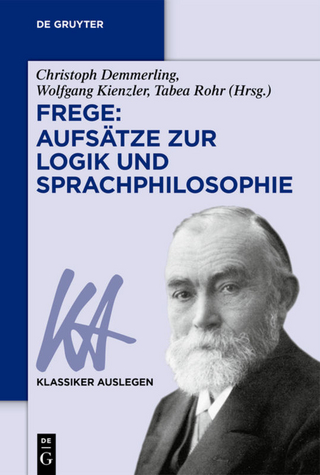
The Boundary Stones of Thought
An Essay in the Philosophy of Logic
Seiten
2017
Oxford University Press (Verlag)
978-0-19-880135-1 (ISBN)
Oxford University Press (Verlag)
978-0-19-880135-1 (ISBN)
Classical logic has been attacked by adherents of rival, anti-realist logical systems: Ian Rumfitt comes to its defence. He considers the nature of logic, and how to arbitrate between different logics. He argues that classical logic may dispense with the principle of bivalence, and may thus be liberated from the dead hand of classical semantics.
The Boundary Stones of Thought seeks to defend classical logic from a number of attacks of a broadly anti-realist character. Ian Rumfitt is sympathetic to many of the premisses underlying these attacks. Indeed, he regards some of them as effective challenges to certain principles of classical semantics, notably the Principle of Bivalence. He argues, though, that they are ineffective against classical logic itself.
The book starts by considering the general problem of how conflicts over logical laws may be rationally discussed and adjudicated. This leads to a consideration of the nature of logic: Rumfitt identifies the particular features that mark out logical consequence from other consequence relations, and he advances a new argument for the ancient thesis that there is a modal element in the notion of logical consequence. He develops a theory of that modal element in terms of perhaps incomplete possibilities, rather than fully determinate possible worlds. Some prima facie powerful arguments against the validity of certain classical logical laws are then analysed in the light of this account of logic. Throughout, care is taken to separate lines of anti-classical argument that, although distinct, are often run together or confused.
The analysis yields, as by-products, semantic theories for a number of problematical areas of discourse. These areas include our talk about sub-atomic particles, about the infinite, about infinitesimals, about sets, and vague discourse. Rumfitt concludes by defending his stance of accepting classical logic while rejecting Bivalence, against Aristotle's argument that a classical logician is committed to Bivalence. The ultimate aim is to liberate classical logic from the dead hand of classical semantics.
The Boundary Stones of Thought seeks to defend classical logic from a number of attacks of a broadly anti-realist character. Ian Rumfitt is sympathetic to many of the premisses underlying these attacks. Indeed, he regards some of them as effective challenges to certain principles of classical semantics, notably the Principle of Bivalence. He argues, though, that they are ineffective against classical logic itself.
The book starts by considering the general problem of how conflicts over logical laws may be rationally discussed and adjudicated. This leads to a consideration of the nature of logic: Rumfitt identifies the particular features that mark out logical consequence from other consequence relations, and he advances a new argument for the ancient thesis that there is a modal element in the notion of logical consequence. He develops a theory of that modal element in terms of perhaps incomplete possibilities, rather than fully determinate possible worlds. Some prima facie powerful arguments against the validity of certain classical logical laws are then analysed in the light of this account of logic. Throughout, care is taken to separate lines of anti-classical argument that, although distinct, are often run together or confused.
The analysis yields, as by-products, semantic theories for a number of problematical areas of discourse. These areas include our talk about sub-atomic particles, about the infinite, about infinitesimals, about sets, and vague discourse. Rumfitt concludes by defending his stance of accepting classical logic while rejecting Bivalence, against Aristotle's argument that a classical logician is committed to Bivalence. The ultimate aim is to liberate classical logic from the dead hand of classical semantics.
Ian Rumfitt studied philosophy at Balliol College, Oxford and at Princeton University. He has taught the subject at Keele University, the University of Michigan at Ann Arbor, University College, Oxford (where he was a Tutorial Fellow for seven years), and at Birkbeck College, London (where he was Professor of Philosophy from 2005 until 2013). He is now Professor of Philosophy at the University of Oxford and a Senior Research Fellow at All Souls College. He has published many articles in philosophical logic, in the philosophy of language, and in metaphysics.
PART ONE: THE NATURE OF LOGIC; PART TWO: FIVE ATTACKS ON CLASSICAL LOGIC
| Erscheinungsdatum | 05.10.2017 |
|---|---|
| Verlagsort | Oxford |
| Sprache | englisch |
| Maße | 156 x 234 mm |
| Gewicht | 552 g |
| Themenwelt | Geisteswissenschaften ► Philosophie ► Logik |
| Geisteswissenschaften ► Philosophie ► Sprachphilosophie | |
| Geisteswissenschaften ► Sprach- / Literaturwissenschaft ► Sprachwissenschaft | |
| ISBN-10 | 0-19-880135-1 / 0198801351 |
| ISBN-13 | 978-0-19-880135-1 / 9780198801351 |
| Zustand | Neuware |
| Haben Sie eine Frage zum Produkt? |
Mehr entdecken
aus dem Bereich
aus dem Bereich
ein Gegenentwurf zum kurzfristigen Denken : so werden wir zu den …
Buch | Hardcover (2023)
REDLINE (Verlag)
18,00 €


